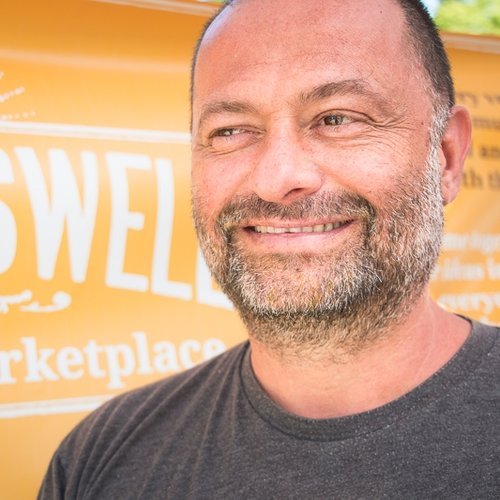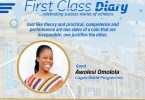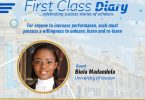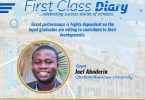Last week, specifically on Nov. 19 – 21, 2019, the World Innovation Summit for Education (WISE) had her biennial global summit on the theme: UnLearn ReLearn: What it means to be Human.
It was a gathering of 3,000 delegates from 110 countries with 200 speakers in 150 sessions. In this interview, I sat with one of the speakers. Gilad Babchuk is the Executive Director and Co-founder of Groundswell operating in Canada. In this interview with Edugist, he sheds insight into the world of business and education. He reveals his passion, plans to expand to other cities in Canada, and also seeks partnership to reach out to other continents, particularly Africa. Enjoy!
Elvis Boniface of Edugist: Please share with Edugist, a little about your background and an interesting thing that majority do not know about.
Gilad Babchuk: I have a background in Business and Education. I was an entrepreneur. And from the start, I have created some companies, social ventures and non-profits. I have always loved and valued education. So, I established some schools, designed my masters degree. Got busy with training teachers, principals. So, I have always had one leg in the business world and one leg in the education world.
EB: As a speaker in this year’s WISE summit, what specific values are you introducing to the delegates?
GB: One thing I am currently doing with my business school, Groundswell is dealing with the pedagogies of purpose. We are actually helping people to redefine their purpose. We have a very different approach to entrepreneurship. A very different approach to education. I think that will add value to the conversation we will have. And keep people hopefully inspired about what we do. Basically, we have taken entrepreneurship and education in a very different approach.
EB: Often times, people complain about the complexity of different approaches, especially when it is time to implement. So, can you say that the implementation of groundswell model, pedagogy for instance is easy?
GB: I wouldn’t say it is easy. And I wouldn’t also say it is all that complicated. I will say you just need to understand the approach and the culture. What we mainly do is to incubate the person and the business idea. Usually the incubator incubates the idea and doesn’t care much about you. It’s the idea that they believe in. And we have a different approach, we believe in you, we can help you. And if we need to push the idea forward, we do that.
So, it is an opposite operation, we’re not looking for unicorns, we are not looking for the regular growth. We are looking for something that you can sort of express yourself through this business. I think it’s easy and not as complicated. It all boils down to the culture.
I don’t believe the schools that we have will bring any solution. I don’t believe that the university as we have them today is adding a lot of value.
EB: So, what is the scope of the people and the idea you take?

L.R with Gilad Babchuk at #WISE19
GB: Let me give you a quick run of the way we think. We think that the future of work is changing. And the numbers of how many people we see that want to be an entrepreneur is huge. If you include the number of people who would be self-employed, it’s huge. The numbers in Canada is 45% starting from 2021. It’s half of the people who would be self-employed. It’s a huge change in market, a huge change in the skills that we see. And the main problem that we see that people have identified is the skills.
And in the future of work, what will happen if you have a bus driver and not the bus driver itself? If you’re looking for the skill, you’d be left behind. So, what we actually need now if most of them are in entrepreneurship, it means entrepreneurship is the new job. We need accelerators in business schools, they’re going to be the new vocational schools. It’s a very different way to look at the new future of work.
Therefore, we realize that people will have to redefine themselves every three years. Let’s say you learn how to cook, and this is the new skill. In three years, the machines will know better than you. So, you’d have to redefine, find a new purpose. The main thing that people will need is what we call the soft skills. So, I don’t think the main problem is the skill, the main problem is the will. The willingness and the flexibility to adapt yourself, to reimagine yourself and not to identify the skills. People have to be more flexible of adapting who they are and what they want to do. And I think the best way to do it is via the purpose. Finding a clear current purpose for themselves. And knowing how to express themselves through this purpose via doing business around them.
We are not teaching you how to build your vehicle but building it with you. And everyone in this garage have a different vehicle but we’re all building together. And it’s based on support of the peers and experts. It’s a different place and almost the opposite of business school.
EB: Is the idea Groundswell selling restricted to Canada or anyone in any part of the world can apply?
GB: Currently, it’s people living in Canada. We are finding a way to upload everything that we do online so that people can apply. We think the best version will be a mixed version of online and offline. So, we are looking for other places, we have like 25 cities in Canada that wants to have Groundswell. And after we finish with the digitals of the contents, we will start to train people to deliver these programs. And that can go international, isn’t it? I think it’s a big feat for all the cultures because what we’re serving now is very diverse. We are serving a marginalized people and privileged people.
The marginalized people are feeling there is a squeeze out of their economy and that is why they come. The privileged people are looking for money while the corporate jobs is taking money out of people. So, we have lawyers and accountants and executives coming through our process. They want to learn how to create a business based on their passion. Hence, we have this diverse community that we serve, with people coming from different walks of life.
EB: You are well known for your role as a social entrepreneur and for the many social enterprises you have founded and co-founded. What birth this burning passion and what has sustained it over the years?
GB: For myself, the main thing that drives me is inclusion. Once the work is changing, the economy is changing. A lot of people are finding self exposure in their economy. And my main passion is to include people in the society, in the economy. Inclusion is just the beginning. What we are trying to do is to ask the question: What is the meaning of life? And the meaning of life for me is you know your purpose. Purpose is changing but you know your current purpose. You know the problem you want to solve, you can express yourself while doing that. And then you can add value to others.

Cross section of delegates at #WISE19
So, once you care about something, you can do something about it as a self-expression and you add value to others. At if it can pay the bills, it’s the best choice. We’re looking at entrepreneurship as a livelihood for a meaningful life. And the way to find a meaningful life is to show that you’re not just doing business. But you are doing something that you care about. You’re making impact, and you have the satisfaction of giving value to others.
EB: Groundswell community is a very large one, and an alternative business school. Can you say confidently that it has served its sole purpose of being an alternative business school as against the conventional business schools?
GB: One hundred percent. We don’t have a business dragon, we are not teaching theory. We do very personal and hands-on. So, what we are doing when we brought the incubation and the accelerator. You are part of us. We take care of how you feel, we take care of your mental values. We take care of the full person that experiences the process of creating the business. And it’s very practical, it’s like Groundswell accelerators is like a garage. Everybody is building their own vehicle and we’re building your vehicle together with you.
We are not teaching you how to build your vehicle but building it with you. And everyone in this garage have a different vehicle but we’re all building together. And it’s based on support of the peers and experts. It’s a very vulnerable place and almost the opposite of business school.
EB: Do you think there are aspects of the education sector that WISE has still not been able to capture?
GB: Honestly, I don’t know what to say about that. It’s a very nice try here. A very different conference, the representation here is amazing. There are so many Asians and Africans participating. Europe, North and South Americans, delegates from every region of the world. It’s a big try, I really commend the organizers for doing such a diverse combo and building an amazing community. And to be so open to many initiatives and to look around schools, businesses, not-for profit initiatives, and social ventures. Because I don’t believe the schools that we have will bring any solution. I don’t believe that the university as we have them today is adding a lot of value. So, I really appreciate the approach that they’re taking. They’re having many ways to tackle the issue of education. Their versions, sectors and ways and they have open minds for that.
I really appreciate Stavros leadership on that in so many ways. And I am really happy to be here.
EB: The leadership and listenership of this interview is largely Africans. Are you planning on doing anything in Africa to support the education system and the various businesses in the coming years?
GB: My approach for that is, if someone in Africa wants to do it, I will do my best to help them. Once they see the scale and possibility of Groundswell model. I don’t think that what we are doing in Vancouver, Canada is going to work in other places. Not even in Canada. So, what I’m looking for is a partner that will come and say: Hey! I really like the concept. And I will do my best to train one and adopt the model. So, for me to get to Africa, I need planning. I need a partner, I need someone locally inspired by this idea, willing to jump into this idea. And that is also willing to influence them.
What does 'reinventing yourself' mean to you? Join Gilad Babchuk of @Groundswellyvr and other education leaders at #WISE19 ! Apply here to attend: https://t.co/lipnO5zo2N#WISETurns10 #education #groundswellyvr pic.twitter.com/oIZjT0ra0I
— WISE (@WISE_Tweets) June 21, 2019
The model that work in Vancouver, Canada cannot be the same in Nigeria. Context is key, economy is key, drive load is key, business environment is key. Culture is key and I don’t want to be in a place that assumes that they know. I think that we have a solution that we have to adopt. So, I am looking at a very humble approach. I really encourage people to be humble entrepreneurs and I want to be humble myself. At least I am doing something here and it’s working. Let’s learn together. What form that you can take, how I can help you implement it. And to adapt it to your landscape.
So, I am looking for partners. Groundswell approach cannot be put down, it has to be collaborated.









[…] apply today for the postgraduate course in luxury brand management. So as to either help a luxury business grow or you may even start your […]